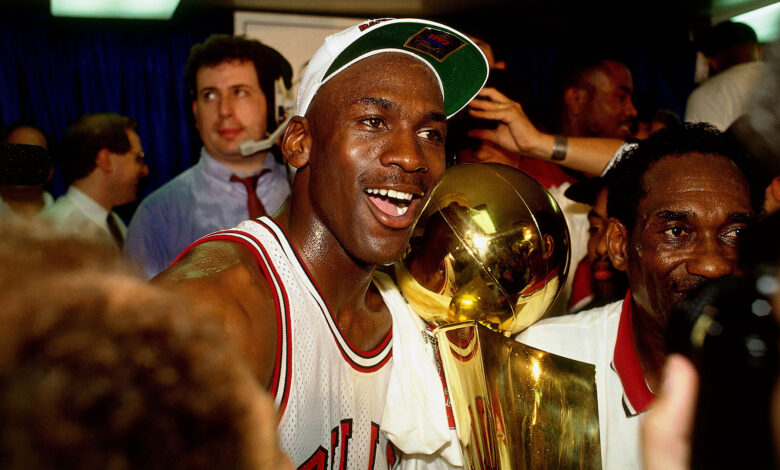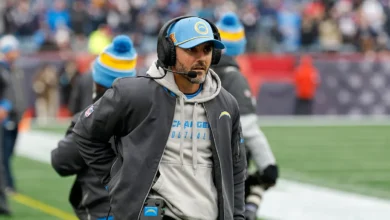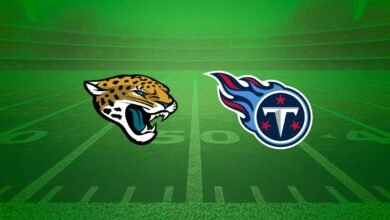
Introduction: A Legend Beyond the Court
When it comes to sports legends, few names carry as much weight as Michael Jordan. Known simply as “MJ” to fans, Jordan is more than just a former basketball player—he is an icon whose influence stretches far beyond the boundaries of the NBA. His career is the stuff of legend: six championships, five MVP awards, two Olympic gold medals, and a global fan base that has only grown with time.
But what makes Michael Jordan truly unrivaled is not just his stats, trophies, or highlight reels—it’s the way he changed basketball forever. From his competitive drive to his impact on sports marketing, Jordan redefined what it meant to be a professional athlete. Even today, decades after his final game, his name still stands as the gold standard in basketball greatness.
This is the story of how Michael Jordan became the ultimate icon, combining skill, charisma, and an unshakable will to win.
Early Life: Humble Beginnings That Shaped a Champion

Michael Jordan was born on February 17, 1963, in Brooklyn, New York, but grew up in Wilmington, North Carolina. His family life was supportive but disciplined, instilling in him the values of hard work and perseverance. Jordan’s competitive nature began early—whether it was playing baseball with his father or racing his siblings in the backyard, he always wanted to win.Interestingly, Jordan wasn’t an overnight basketball prodigy. In fact, he famously didn’t make his high school varsity basketball team on his first try. Instead of quitting, he used the disappointment as motivation, training relentlessly to improve his game. This moment, often retold in sports folklore, perfectly illustrates his mindset: setbacks were simply fuel for the next victory.
By the time Michael Jordan finished high school, Jordan had transformed himself into one of the most promising young players in the country. His determination caught the attention of college scouts, paving the way for his legendary journey.
College Years: The Rise of a Star at North Carolina
Michael Jordan attended the University of North Carolina at Chapel Hill, playing under the guidance of legendary coach Dean Smith. From his very first season, Jordan proved he was a special talent. His poise under pressure became evident during the 1982 NCAA Championship, when he hit the game-winning shot against Georgetown—an early preview of his clutch DNA.
At UNC, Jordan developed not just his skills but also his understanding of team dynamics. While he could score with ease, he also learned the importance of defense, ball movement, and leadership. Coach Smith’s emphasis on fundamentals shaped Jordan into a complete player, preparing him for the NBA’s competitive landscape.
After three successful seasons, including winning national college player of the year honors, Jordan made the leap to the professional league. The basketball world was about to witness something extraordinary.
NBA Career: Dominance with the Chicago Bulls
When Michael Jordan was drafted third overall by the Chicago Bulls in 1984, the franchise was struggling. Attendance was low, and the team was far from being championship contenders. That all changed the moment Jordan stepped on the court. His explosive athleticism, incredible scoring ability, and showmanship instantly made him a fan favorite.
By his rookie season, Jordan was already averaging over 28 points per game, winning the NBA Rookie of the Year award. But his true dominance came in the 1990s, when he led the Bulls to six NBA championships in two separate three-peats (1991–1993 and 1996–1998). Along the way, he collected countless individual honors, including five MVP awards and ten scoring titles.
Jordan’s competitiveness was unmatched. Teammates and opponents alike spoke of his relentless drive to win—whether it was the NBA Finals or a simple practice drill. He thrived in high-pressure situations, delivering some of the most iconic performances in basketball history, like the “Flu Game” in the 1997 Finals and his final shot as a Bull in 1998 against the Utah Jazz.
The Air Jordan Brand: Redefining Sports Marketing
While his on-court dominance was undeniable, Michael Jordan’s impact went far beyond basketball. His partnership with Nike to create the Air Jordan brand revolutionized sports marketing. When the first Air Jordan sneakers were released in 1985, they didn’t just sell—they caused a cultural shift.
The shoes became a fashion statement, appealing not just to basketball fans but to music artists, streetwear enthusiasts, and everyday people. The Air Jordan brand became a global phenomenon, spawning new designs year after year and building an empire worth billions.
Jordan proved that athletes could be more than just players—they could be global brands. His success in marketing inspired generations of athletes to pursue similar opportunities, making him a trailblazer in the business of sports.
Competitive Spirit: The Drive That Made Him Unstoppable
One of the defining aspects of Michael Jordan’s greatness was his legendary competitive spirit. He didn’t just want to win—he needed to win. This mindset extended beyond basketball games into everything he did, from golf matches to card games with teammates.
Stories from former teammates paint a vivid picture of Jordan’s mentality. He would challenge players in practice to push them to their limits, sometimes clashing with them but always demanding the best. His ability to maintain focus under pressure and turn challenges into opportunities was a key reason for his sustained success.
Jordan’s competitive edge wasn’t about arrogance—it was about refusing to settle for less than excellence. That attitude became a hallmark of his legacy and an inspiration for athletes in every sport.
Cultural Influence: From Basketball Court to Global Stage
Michael Jordan’s influence reached far beyond the NBA. He became a cultural icon in the 1980s and 1990s, appearing in commercials, movies, and endorsements that cemented his status as a household name. His starring role in the original Space Jam movie in 1996 blended basketball with pop culture, attracting even more fans around the world.
His fashion sense, charisma, and the global appeal of the Air Jordan brand helped shape modern sports culture. From hip-hop lyrics to video games, Jordan became a symbol of excellence, ambition, and style.
Even today, young players who never saw him play live still know his name and aspire to “be like Mike.” His ability to inspire across generations is a testament to his enduring cultural relevance.
Legacy: The Unrivaled Icon of Basketball
Michael Jordan’s career ended with him as a six-time NBA champion, six-time Finals MVP, and arguably the greatest player of all time. But his true legacy lies in the way he changed the game itself. He inspired a new era of athleticism, raised the bar for competitive excellence, and proved that sports icons could transcend their sport.
His influence can be seen in the careers of players like Kobe Bryant, LeBron James, and countless others who grew up idolizing him. Every time a player hits a game-winning shot, wears Air Jordans on the court, or speaks about the importance of hard work, Michael Jordan’s legacy lives on.
To this day, debates about the “GOAT” (Greatest of All Time) in basketball almost always start—and often end—with his name. Whether or not future generations surpass his achievements, his place in basketball history is secure.
Final Thoughts: More Than Just a Player
Michael Jordan wasn’t just the best player of his era—he became a global symbol of excellence, determination, and success. His journey from a high school player who didn’t make varsity to a six-time NBA champion is proof that greatness is built on hard work, resilience, and an unshakable belief in one’s abilities.
Even in retirement, Jordan’s influence continues, from his ownership of the Charlotte Hornets to his ever-growing Air Jordan empire. His story remains a blueprint for aspiring athletes, reminding the world that with enough passion and dedication, limits can be shattered.
Michael Jordan will forever be the unrivaled icon of basketball—not just for what he accomplished on the court, but for the way he inspired millions to chase greatness.



